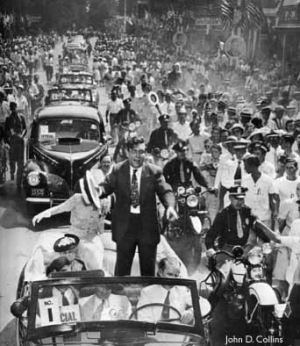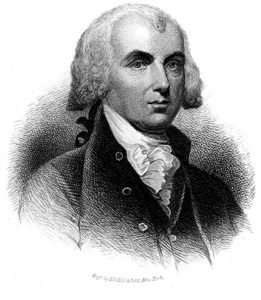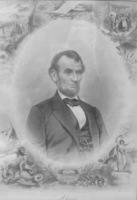An address given by Willkie at the 44th Congress of American Industry on December 8th, 1939

Willkie on the Campaign Trail
The history of government is the history of two conflicting principles: one is the supreme importance of the State; the other is the supreme importance of the individual. Either the people have believed that the State was merely the voluntary creation of individual citizens, responsible to them and designed primarily to protect their liberties; or else they have believed that the State was an authority in its own right to which individual citizens were subject and which could demand of them the suppression of their own desires and talents. The individual versus the State – that is the theme which more than any other has determined the course of civilization.
The distinction between these two philosophies is primarily one of objective. To those who believe in the State, the purpose of government is to increase its coercive powers, so as to regulate the way the people live. This distinction transcends in meaning all other political distinctions. We call England a monarchy, for example, and yet, ever since the Magna Charta in the 13th Century, the rights of the individual in that country have been of greater importance than the authority of the State. On the other hand, we call ancient Greece a republic, and history regards few governments as more efficient. But in ancient Greece, as in ancient Rome, the citizen belonged neither to himself nor to his family; he belonged to the State and was subject at all times to it peremptory and irrevocable demands. And in the very antithesis of monarchy – namely, communism – the State, as we have seen in Russia, owns the lives of the citizens completely.
It is not the form or title of government which determines its character; it is its purpose.
The conflict between these two philosophies – the individual versus the State – provided the impulse behind the formation of the United States of America. This country was founded on the idea that the individual is the source of the State’s power and that the State was created by and of the men in it, and existed only to serve them. In fact, the United States is the only country which was organized on this principle from the very start. And, for the first century and a half of our existence, we were fortunate in living in a period when throughout the western world the doctrine of individual rights was gaining over the doctrine of absolute State power.
This is no longer true today. In modern Germany and Italy the leaders of the people proclaim the supremacy of the State. For a man to sacrifice his personal beliefs, his moral standards, his livelihood and his God for the sake of the State is regarded as a noble thing. For a woman to produce more and more babies for the armies of the State is an action to be rewarded by a medal. Even the two greatest liberty-loving countries of Europe – England and France have now, because of a war to defend their ideals, surrendered their individual liberties and returned to an absolute government.
Today, the United States stands alone among the great countries in its emphasis upon the rights of the individual.
To my mind this spiritual isolation is no particular cause for alarm. I do not believe that we shall change our faith by any action from without. If we change it, it will be because of some weakness within. And even then, we shall not change it directly. It is bred in us too deeply. If we accept the doctrine of the authoritarian state, we shall do so gradually, indirectly, and perhaps, even unconsciously. We shall do so with the worthiest of motives. We shall say, for example; “The newspapers print too much gossip, let the government censor them; our economic future is too uncertain, let the government do the planning; it is too hard to clean out our business stables, let the government do it for us.” We shall yield more and more of our liberty under the delusion that we are giving it up only temporarily until things get straightened out, and after the deal is made, it will be too late. The Devil will have gone off with our birthright.
Editor’s Note: Isn’t this exactly how the process of compromised liberties has taken place over the last eighty plus years? Willkie penned this speech in 1939, and how right on the money he was. – Ed.
 “They that give up essential liberty to obtain a little temporary safety,” stated Benjamin Franklin, “deserve neither liberty nor safety.”
“They that give up essential liberty to obtain a little temporary safety,” stated Benjamin Franklin, “deserve neither liberty nor safety.”
There are many liberties which we in America regard as fundamental. But tonight we are talking specifically of the right of free economic enterprise. We have given the Federal government extensive powers over the economic and financial mechanism of this country in the past few years, and under these powers regulation was instituted in the name of reform. I believe that much of it was desirable, but now we need to be careful lest that power be used gradually, indirectly, to take away our liberties. We need to re-examine the relationship between the people’s government and the people’s industry on the basis of this question: Have we gone so far in regulating free economic enterprise that we have taken the life out of it?
Regulation has crept up on us steadily. The amount of it now imposed upon industry can be illustrated by the number of returns which must be filed with the Federal government. Last year the President appointed the Central Statistical Board to study this question. The report, of course, did not include the returns which an industry must file with any one of the 48 states in which it might happen to be located.
To fulfill the Federal government’s requirements alone, the Central Statistical Board reported that about 21,000,000 returns of all kinds were filed for farms, making an average of approximately three returns per farm during the year. A total of 60,000,000 returns were filed by industrial, commercial and financial enterprises, not including farms, or an average of about 20 per enterprise per year. Each of these contained answers to an average of about 65 questions. Every return filed adds to the power of the Federal government over our private enterprise.
The most alarming feature of this concentration of power in the Federal government is the creation of omnipotent commissions to exercise it. The new fields of Federal control are administered by small Boards or executive commissions, usually appointed by the President and responsible to no one but the President. They are part of the Executive Department. But their function is not executive only. They have two additional functions: one is legislative, the other is judicial. These commissions write the rules which make the laws effective. Then they administer the rules; and when the rules are violated, they it in judgment on the violations.
The Securities and Exchange Commission, for example, makes the rules for virtually all security financing throughout the country; for all of the country’s stock exchanges; and for the financial operations of the utilities. When the rules are broken, the members of the Commission prosecute the offender and sit as judges to decide the penalties. In the same way, the National Labor Relations Board makes the rules government collective bargaining and working conditions under the Wagner Act and then becomes both prosecutor and judge with respect to violations of the Act.

James Madison
James Madison, who was chiefly responsible for the Constitution of the United States, stated: “The accumulation of all powers – legislative, executive and judicial – in the same hand… may justly be pronounced the definition of tyranny.” And Lord Bryce said: “The separation of thee powers is the fundamental characteristic of the American National Government and upon it depends the freedom of the individual.”
Moreover, the rules prescribed by a commission involve the factor of uncertainty. Unlike the laws of Congress, they are not written in black and white upon the statute books. They may be changed at any time, at the commission’s will. In the past five years there have been four chairmen of the Securities and Exchange Commission; and at each change the utilities and the stock exchanges and the corporations seeking capital have held their breath, waiting to find out what the attitude and policy of the new chairman would be.
For under commission regulation we do not have a government of laws. We have a government of men, and the conduct of an enterprise may be determined by the caprice of a commission chairman. There isn’t a man in this room who does not recognize the importance of the good will of Washington’s commissions. There isn’t a man in this room who does not know that if he criticizes a commission today, he and his company may suffer for it tomorrow. This is not a mere generality – it is a well – considered statement with abundant proof in my mind and your experience.
There are many who will say that State control in America is different from State control in Europe because in Europe it is exercised by a despotic government in which the people have no voice. Seventy-five years ago this argument was answered by one of the greatest of the English liberals. “The real issue,” Herbert Spencer said, “is whether the lives of citizens are more interfered with than they were; not the nature of the agency which interferes with them…. If men use their liberty in such a way as to surrender their liberty, are they thereafter any less slaves?“
Seven years ago the people of the United States set out upon what they thought was a great liberal campaign. They wanted to shake from their shoulders the burden of economic insecurity, of malpractices in business and finance, of wasteful speculation.They wished to control, insofar as possible, the conditions which limited the freedom of men.
Somewhere along the road we lost that objective. Instead of seeking to make men free–free to fight their own battle against poverty and fear and adversity under conditions that provided a fair chance to win–we decided to let the government fight the battle. The government wore the colors of the people’s champion, but its conception of its function became authoritarian. It acted from the top on behalf of the people.
 I believe that attitude to be a serious error. You will remember that democracy does not mean government for the people, only. As Lincoln was careful to point out, it means government of the people and by the people. The present government seems to have tried to take over the functions of America’s free economic enterprises, instead of taking care that those enterprises should function honestly and encouraging them to function more efficiently.
I believe that attitude to be a serious error. You will remember that democracy does not mean government for the people, only. As Lincoln was careful to point out, it means government of the people and by the people. The present government seems to have tried to take over the functions of America’s free economic enterprises, instead of taking care that those enterprises should function honestly and encouraging them to function more efficiently.
Now and then in its relations with private enterprise the government has established a temporary “policy of appeasement,” or “a breathing spell,” – pleasant little intervals between hostilities. And when we have optimistically believed these to be periods of government cooperation – some government official has sounded the trumpet for a new attack upon the people’s industries. Each time the tired business man has settled down to his business, with a somewhat happier smile on his face, he has been roused by a new threat of government antagonism – much as the Egyptians used to carry around a mummy with the last course of every banquet to indicate that death was never very far away.
But government is not the only transgressor. Business, too, need to mend its ways. For many years various sections of American industry have asked for special legislation which offered a temporary benefit at the expense of normal economic processes.
Business has asked for special subsidies and special tariffs, for special protection against price cutters or low cost producers, for government appropriations for this or that special purpose. Business cannot ask for government interference at one time, and then indignantly reject it at another.
And it hasn’t been a pretty picture to see business, in the hope of advantage, craven and afraid to take its case to the people.
Moreover, we have witnessed within the past few years a rapid increase in the number of state tariffs and state regulations interfering with interstate commerce. Such action is suicidal. The greatness of the United States has depended partly upon this factor – namely, that it is the largest free trade area in the world. Here, again, business must take an interest in maintaining that free flow of commerce, from the lack of which Europe has so greatly suffered.
In the past few years the government has contributed some brave words and some moving phrases to the language of the American people. It has talked a great deal about “security.” It has talked about “truth in the market place.” It has talked about “economic planning” and “the more abundant life.” The passwords have not admitted us into the promised land nor even into a land of promise; the unemployed still have no jobs and the young men have no dreams. It is true that the State has become rich indeed; but the people remain poor. The State has more power than it ever had before. The State spends eight billion dollars a year. The State, with 70 percent of all the world’s gold, has the largest buried treasure in history and one which is likely to be as profitless and as legendary as that of Captain Kidd.
All this the State has, but does the individual have more freedom and more opportunity, or less? The dozens of commissions and agencies and bureaus in Washington may have a more abundant life, but not the people whom they serve.
From now on, our purpose should be not to augment the powers of the State, but to increase the opportunities offered to the individual. We are a hard-headed, practical race, and we have chosen the enterprise system as our way of life, not for sentimental reasons, but because it has created more benefits for more people in less time than any other.
